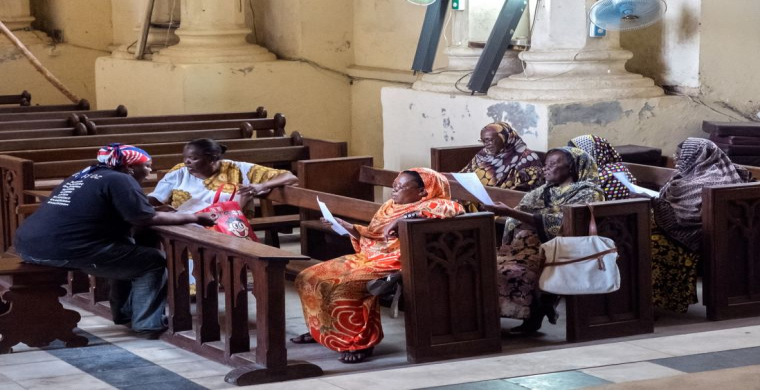In Tanzania, the thought of a church in decline is inconceivable
By Susie Leafe
https://www.christiantoday.com/
August 7, 2022
Parishioners inside Christ Church, the Anglican cathedral in Zanzibar, Tanzania.(Photo: Getty/iStock)
Today, Tabora, in the west of Tanzania, is a place that very few visitors go.
It has not always been that way. In the 1850s, Arab slave and ivory traders began to develop a settlement to support their caravans as they crossed from Lake Tanyika (where the slaves captured in the Congo delta would join the caravan) to the port on the Indian Ocean (where they would be shipped to the Arab peninsula).
By 1871, the town was estimated to have a population of about 20,000 people. By the turn of the century, Tabora had become a headquarters of German East Africa, until they were overthrown at the Battle of Tabora by an Anglo-Belgian force in 1916, and the British became the colonial power until Tanzania gained independence in 1961.
It is a history that the Bishop of Tabora, Rt Rev Elias Chakupewa, was keen to share when we spoke at the Lambeth Conference.
"Arabs were in Tanzania for many years before Christianity. So, there are a very good number of Muslims," he says, before continuing, "I was born as a Muslim, into a Muslim family. My father and mum were Muslims."
It was when he was 19 that he converted to Christianity.
Bishop Elias is the third Bishop of Tabora.
"The diocese is physically very large, 96,000km2 - bigger than Rwanda and Burundi" - or for a UK audience, about three times the size of Wales.
"The church is growing very fast in comparison with those days. It began in 1989 with 10 parishes -- but now we have about 43 parishes. And also the number of people -- there were very few -- but now there are about 20,000 people."
Evangelism is a big part of what they do.
"We have much evangelism in the villages and one of the most important bits of my role as Bishop of Tabora is to make sure that we plant new churches in the villages using local people.
"So we send local missionaries -- we call them church planters. We send them to the villages to plant new churches."
His only sadness is that he is no longer able to be involved in that direct contact with people.
"As a bishop I can't go to the villages to do an evangelistic call. There are many people waiting for the bishop for confirmation services. When you go to the village to do a confirmation service, you find hundreds of people waiting for the bishop."
Such growth is not uncommon in the Global South. In fact, to many bishops gathered at the Lambeth Conference the idea of a diocese in decline is inconceivable.
When asked what his most memorable moment of the conference was, Bishop Zechariah Manyok Biar Mangar from Wanglei in South Sudan said, "I met a bishop from Australia who said he might be the last bishop of his diocese. The people in his diocese are becoming secular. We could not imagine such a thing in South Sudan - where people are coming out of the churches."
Bishop Elias only decided to come to the Lambeth Conference at the last minute. Until then he had been planning to boycott the event, along with those from Nigeria, Rwanda, Uganda and many other parts of the Global South. In the end he decided to come, saying "and even if they will not hear our voice, we will shout whatever we can say."
Ironically, after all the shenanigans about 'voting' for the Lambeth Calls, by machine or by voice, at this conference, 'shouting' was the one thing he and his fellow orthodox bishops were unable to do. The Archbishop of Canterbury announced there would be no vote, even by voices, on the one part of the Lambeth Calls that sought to address the issue of biblical authority and human sexuality that has divided the Communion for decades.
Tabora is a growing diocese. They have few resources, but churches are being planted, leaders are being trained. They have schools and clinics; they reach out to young people and teach them skills. Lucy, Elias' wife -- they come as a team - is involved in so many of these projects but her passion is helping other women earn a living by raising livestock (chickens, guinea fowl, geese and pigs). This is the whole gospel for the whole person in practice.
At the Lambeth Conference, despite their wisdom and experience, Bishop Elias and Lucy were on the edge of what was happening. And they were not the only ones. He shared his fears that some at Lambeth would use promises of aid to tempt bishops to accept unorthodox beliefs and practices.
Tabora is a place where few visitors go, which is a shame, because it seems they have much to teach their former colonial powers if only we would listen.
As Bishop Elias said, "In the Acts of the Apostles (4:12) it says there is only one name that we were given for people to be saved. There are many names in the world; very prominent names, but only one name can save human beings."
If the Anglican Communion learns to listen to bishops like the Rt Rev Elias Chakupewa, there may be hope for the future.














